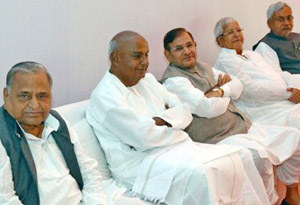New Delhi, Dec 4: In a move aimed at consolidation of opposition forces, six constituents of the erstwhile 'Janata Parivar' will soon become one party as their leaders today authorised Samajwadi Party supremo Mulayam Singh Yadav to work out the "modalities" in that direction.
In their first joint action outside Parliament, SP, Janata Dal (Secular), Rashtriya Janata Dal, Janata Dal (United), Indian National Lok Dal and Samajwadi Janata Party will hold a 'dharna' here on December 22 against government's "failure" to bring back black money stashed abroad, its alleged U-turn on farmers' issue and rising unemployment.
The leaders of the six parties today "authorised" Mulayam at a meeting at his official residence to "work out modalities" for becoming one party through a merger, JD(U) leader Nitish Kumar told reporters here.
Seeking to dispel any ambiguity as to the proposed merger, Kumar said that all of them felt there should be "one party" as they have the same philosophy and principles.
Asked whether the move to join forces was borne of a 'fear of Narendra Modi', Kumar said it that not the case but the aim was to form a platform in the current political atmosphere.
He said that the six parties would like to work in tandem with entities like the Left Front, which would be approached. Kumar did not, however, elaborate further.
Besides Mulayam and Nitish Kumar, the meeting, which was the second such one in a month, was attended by RJD chief Lalu Prasad, JD(U) president Sharad Yadav, SP leader Ram Gopal Yadav, JD(S)'s HD Deve Gowda, INLD's Dushyant Chautala and SJP's Kamal Morarka.
Responding to questions on whether the proposed party would contest the upcoming Delhi Assembly polls, Kumar said the leaders concentrated on the "national scene" and the talks were not restricted to any particular state.
He said while the parties have been speaking in the same voice on issues of public interest in Parliament, they have decided to hold their first joint action by organising a 'dharna' outside its premises here on December 22.
The dharna is aimed at attacking the NDA government on the black money issue. He said that its pre-poll promise about bringing back black money to the country and using it to give Rs 15 lakh to every citizen has not been fulfilled.
Kumar, the former Bihar chief minister, said that while farmers were promised an MSP which was 1.5 times more than their input cost, the government is now discouraging states from giving a bonus to farmers as it is pushing out private players.
"It is a U-turn," he said, adding that the six parties will also highlight the issue of unemployment as the NDA dispensation has allegedly put a ban on new openings in government jobs.






Comments
Add new comment